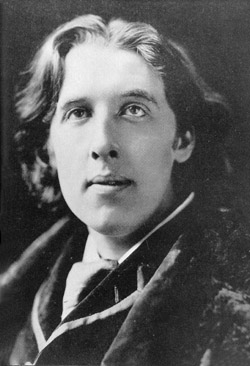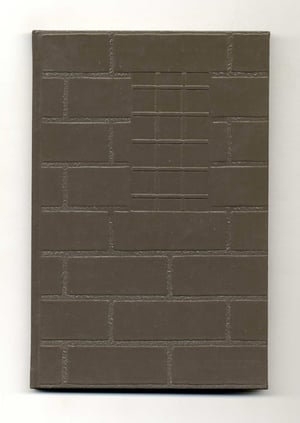Oscar Fingal O'Flahertie Wilde was born on October 16, 1854 and today marks the 164th anniversary of his birth. The writer was schooled first in his native Dublin, then later at Oxford where he began to subscribe to the fledgling school of thought known as aestheticism, a philosophy he would adhere to for the rest of his life. He became a sort of aestheticism poster boy, writing in a variety of genres, from poetry and novels to plays and journalism. Wilde even spent some time lecturing in the United States on the subject as well as the tangentially-related topic of interior decorating, a turn which might seem odd at the outset but actually jives quite well with Wilde's notable, larger-than-life persona.

Beyond his writing accomplishments, he was, to use a term common today, famous for being famous. He was known for his outrageous personality, witty conversation, and scandalous affairs. In spite of his fame and success, he was eventually imprisoned at the height of his fame and sentenced to two years hard labor after being targeted by the Marquess of Queensberry in retaliation for Wilde's relationship with his son, Lord Alfred Douglas. He died of meningitis only a few years after his release, mostly alone and penniless. In 2017, Wilde was posthumously pardoned under the Policing and Crime Act, also known as the Alan Turing Law, which pardoned over 50,000 men historically convicted for homosexual acts. In honor of Wilde's varied, impressive, and sadly short career, consider adding some of these works to your collection.
The Importance of Being Earnest
Widely considered Wilde's dramatic masterpiece, this play was actually part of the feud between Wilde and the Marquess of Queensberry. On the opening night, Queensberry had planned to attend and humiliate Wilde by throwing rotten vegetables on the stage during the opening act. However, someone tipped him off and Queensberry was denied entry into the theater.
This satirical play is now considered a classic and focuses on a case of mistaken identity as well as the concept of earnestness. Though it was performed in 1895, it was not published until 1898, after Wilde's release from prison and only two years before his death. The play is still being performed today, and there have been three film adaptations, most recently a 2002 version starring Reese Witherspoon, Colin Firth, and Dame Judi Dench.
A Picture of Dorian Gray
A Picture of Dorian Gray is Wilde's only novel. It was originally published in Lippincott's Monthly Magazine in 1890 and was released in book form in 1891. This Gothic novel borrows some themes from Faust in regards to deals with the devil. It focuses on art, aestheticism, class, and the concept of living a double life. The character of Dorian Gray has become somewhat of a horror figure in recent years, being portrayed in films like The League of Extraordinary Gentlemen and the television show Penny Dreadful. The novel itself has been adapted numerous times, most recently in the film Dorian Gray, starring Ben Barnes as the titular character. The original publication was highly edited, with many details and references to homosexuality cut out. Those interested in seeing the original, unedited version as Wilde intended should seek out The Picture of Dorian Gray: An Annotated, Uncensored Edition released in 2011 by Belknap Press.
"Ballad of Reading Gaol"

This long poem is the last work Wilde published during is lifetime. He wrote it in 1897 and was inspired by a hanging he witnessed in prison of a man convicted of slitting his wife's throat. The poem was originally published in Reynolds Magazine, then later by Leonard Smithers. The author was listed as C. 3. 3. in reference to Wilde's cell block number. It was not revealed for over a year that Wilde was in fact the writer.
The poem is notable for its depiction and reflection on the harsh punishments faced by prisoners. The poem is often quoted and has been referenced in other media, such as the television show The Virginian and in Anthony Burgess' A Clockwork Orange. This poem is worth adding to any Wilde collection not only because it is the last work published in his lifetime, but because it depicts a totally different Wilde than is reflected in the aestheticism-focused body of work before his imprisonment.
De Profundis
Upon his death, Wilde named journalist Robert Ross, his friend and former lover, as literary executive. One of the unpublished works he gave Ross was a letter he had written to Lord Alfred Douglas during his prison sentence. The letter, written one page at a time with each page being taken from him upon completion, reflects on their relationship and explains Wilde's personal changes while incarcerated. Wilde gave it to Ross that he would type a copy for Wilde to keep and send the original to Douglas. However, Ross was concerned that the original would be destroyed, so he sent Douglas a copy instead. The letter was not published until 1905 when it was released in German in Neue Rundschau. It was later published in a collection of letters released by Ross. Ross donated the original manuscript to the British Museum, and it is currently on display at the British Library. Those who want to own a copy for themselves might choose The Complete Works of Oscar Wilde. Volume II: De Profundis; Epistola: In Carcere et Vinculis released in 2005 by Oxford University Press. It contains the same version that's on display at the British Library.









